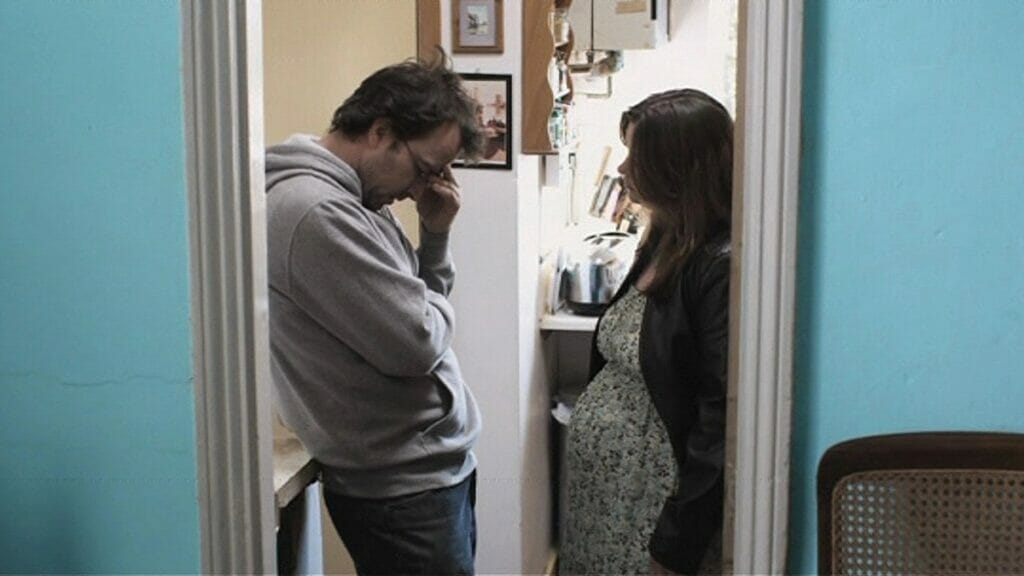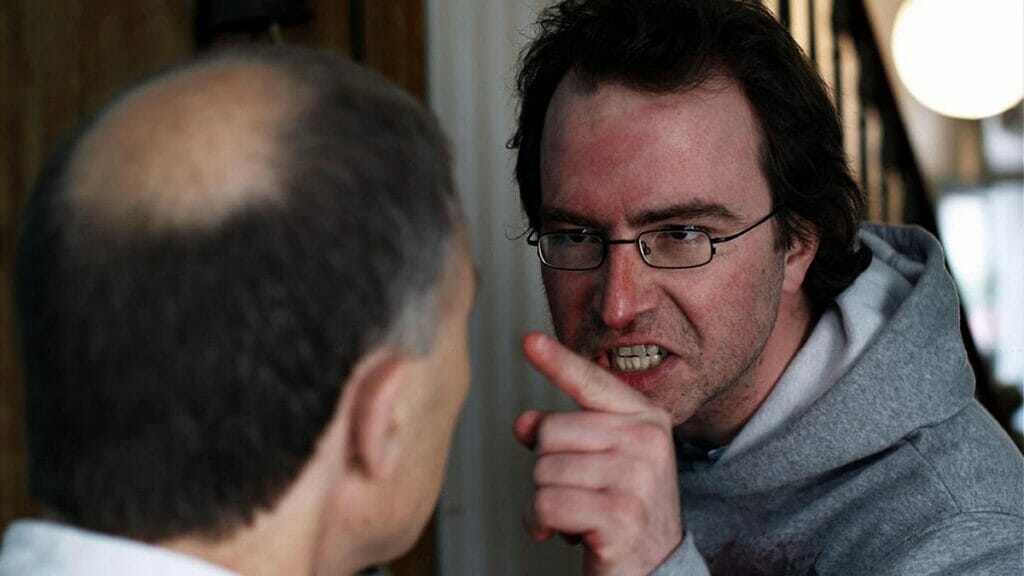Ben Wheatley’s debut film rejects cool attitude and snappy dialogue to tell a working-class tale of crime.

Every month, The Spool chooses to highlight a filmmaker whose works have made a distinct mark on the cinematic landscape.
With his love of mixing horror, dark comedy, and crime Ben Wheatley has been flirting with but never breaking through to the mainstream. However, this month that may all change.
This piece was written during the 2023 WGA and SAG-AFTRA strikes. Without the labor of the writers and actors currently on strike, the movies being covered here wouldn’t exist.
It doesn’t take long for Ben Wheatley’s first movie, Down Terrace, to give the audience its thesis statement. Newly released from lockup, father and son criminals Bill (Robert Hill) and Karl (co-writer Robin Hill) make their way home via quiet British streets wearing rumbled off-the-rack suits. These are definitively not the cool thugs of Guy Ritchie. They have no sense of style or the money to execute one, even if they did. They live in a typical neighborhood in a bland small house. The director/co-writer’s vision of this world is clear. Crime neither pays nor is glamorous.
Shortly thereafter, the film makes one more aspect of these characters clear. They are not pleasant individuals. This isn’t a working-class portrait of decent people turning to crime. Bill’s henchman Garvey (Tony Way) welcomes the two home with the kind of enthusiasm almost no one can muster for their boss. Not 15 minutes later, he must endure the patriarch’s withering contempt for his weight. Bill doesn’t even seem to be doing it with humor or malice. He picks on Garvey simply because he can.
Early on, Down Terrace’s structure and pacing mirror the movie’s characters. There’s a sort of ramshackle meandering nature to the action. Viewers watch Bill sing with some friends, his wife Maggie (Julia Deakin) prepare food, Karl strums out a tuneless ditty on his guitar. The sense of easily deployed spite the senior Hill gives Bill keeps one too on edge to get bored, but it isn’t exactly thrilling either. Again, Wheatley wants to depict crime as an occupation. In the same way life as any midlevel white or blue collar job tends to lack boundless excitement at work or home, so it is for Bill and his “gang.”

There is one moment where the kind of thrilling criminal element that many crime films traffic in darkens the family’s door. However, it is neither fun nor exciting. Instead, it reads immediately as dangerous. Maybe there are cool, clever, well-dressed criminals in Down Terrace’s world, but they are interlopers, predators from a different place and social strata. Bill may be the boss in his little part of the world, but the scene makes it very clear any attempt to make the big leagues would end badly for him.
There’s an almost hypnotic quality to the events. It distracts the audience so much they likely don’t register the moment Down Terrace reveals the nastier cards to come. Yes, Bill and Maggie decide–in their kitchen over tea–to hunt down a rate. They’re convinced someone in the organization snitched on father and son to the authorities. That person needs to be punished. But the floodgates of building violence actually open far earlier, with the arrival of Karl’s estranged girlfriend Valda (Kerry Peacock) and the revelation she’s pregnant. In this moment, Karl simultaneously resents his place in the criminal family and deploys its tools to address his negative feelings.
Even if you don’t share the writers’ sense of humor, it is easy to sense how much they’re laughing at each act of bloodshed.
Once more, Wheatley forces the audience to confront the fact that no one in this world is heroic. Yes, Karl wants out of the criminal lifestyle. On the other hand, he also has no moral quandary with committing murder himself to settle petty grievances. In this case, he’s all too pleased to off not the man who briefly dated Valda, but the man’s brother who told Karl about it in the first place.
With that first killing, Wheatley gets to wield another one of the trademarks—intensely dark humor. A wave of violence erupts from within the family’s ranks, bristling with brazenness, sociopathy, and incompetence. Even if you don’t share the writers’ sense of humor, it is easy to sense they’re laughing wildly at each act of bloodshed.

The script has less conviction and skill when it comes time for Down Terrace to break serious. The movie does an excellent job of showing the fractures and resentments between these people. However, in this third act, it shifts from demonstration to assumption. It seems to expect the audience will get why these decisions and events are heartbreaking without laying the groundwork to prove it. After taking its time to introduce the audience to its world, the movie rushes into its denouement. As a result, when the credits roll, some may feel unsettled. However, most will not grieve in a way the film seems to take for granted that they will.
Disappointing conclusion aside, however, Down Terrace acts as a strong introduction to Wheatley’s cinematic worldview and particular preoccupations. His interest in the low-rent variety of criminal, the way he links laughs and bloodshed, and even his use of creeping horror all make their presence known. His style will evolve, but the themes Wheatley will tap time and time exist on front street already.